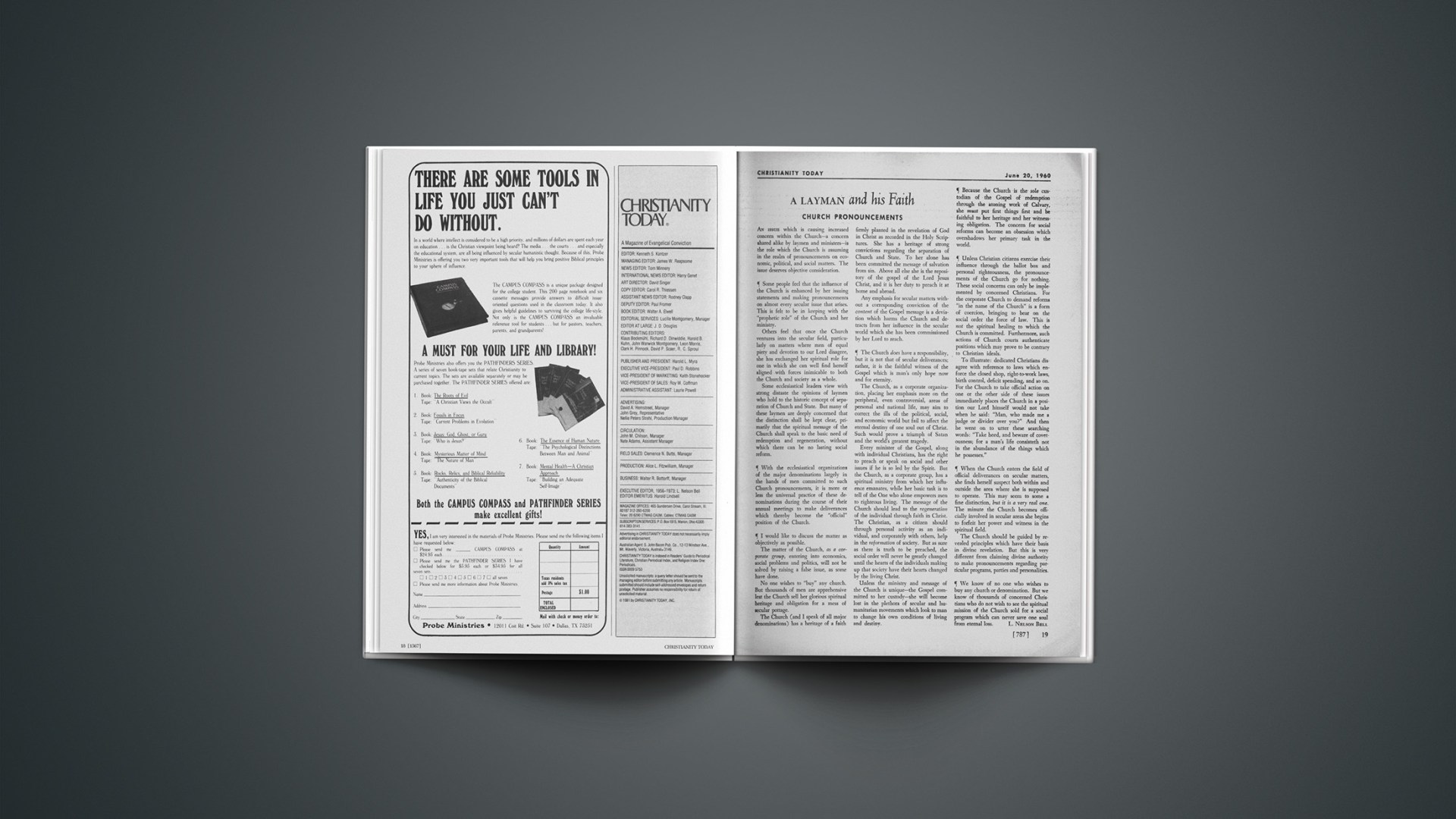The prophecy of Obadiah bears two unique distinctions. First, it is by far the shortest book in the Old Testament, consisting of one chapter and 21 verses. Secondly, it is the most difficult written prophecy in Scripture to identify as to time of composition. In the case of other prophets there is usually a fair amount of agreement among conservative scholars as to the age when they performed their ministry and committed their inspired utterances to writing, but for this book the conjectures of evangelical authorities (not to mention the liberals) range all the way from the reign of Jehoram, son of Jehoshaphat (848–841 B.C.), to about 585 B.C., soon after the destruction of Jerusalem by the Chaldeans. Luther preferred this latter date, as does Clarence Benson in the Evangelical Teacher Training manual on Old Testament Prophecy. Liberals also prefer this date, although many of them see in these few verses a combination of two different authors, the later of which wrote during the Exile or some decades after the fall of Babylon (539 B.C.).
A few conservatives, like J. H. Raven and J. D. Davis (followed by H. S. Gehman in the Westminster Dictionary), prefer to date this prophecy in the reign of Ahaz (736–716), who carried on an unsuccessful war with the Edomites and Philistines. Second Chronicles 28:17–18 records how these two nations attacked Judah from the South and West after the northern coalition of Israel and Damascus had inflicted serious reverses on the armies of Ahaz. One difficulty with this view, however, is that no such capture and spoliation of Jerusalem took place during these campaigns as is implied in verse 11 of our text.
Most evangelical scholars of the nineteenth and early twentieth centuries have inclined towards a still earlier dating of Obadiah, which would make him the very first of the writing prophets! Delitzsch, Keil, Kleinert, Orelli, and Kirkpatrick all feel that the historical allusions and the general political situation presupposed in the text point more definitely to the reign of Jehoram than to any other. In 2 Kings 8:20 we read: “In his days Edom revolted from under the hand of Judah, and made a king over themselves.” The next verses speak of Jehoram’s unsuccessful campaign against them, in which he inflicted much damage upon them but failed to subjugate them again to Judah’s suzerainty. More details of Jehoram’s reign are given in 2 Chronicles 21:16–17: “And Jehovah stirred up against Jehoram the spirit of the Philistines and the spirit of the Arabians that are beside the Ethiopians; and they came up against Judah and brake into it, and carried away all the substance that was found in the king’s house, and his sons also, and his wives; so that there was never a son left him save Jehoahaz, the youngest of his sons.” Putting these two items of information together, it becomes altogether probable that the Edomites cooperated with the Arabian-Philistine invasion as subordinate allies, and shared in the booty of Jerusalem when that proud capital fell to their combined efforts.
It is of the utmost importance to observe that the text of Obadiah implies just this historical incident in verse 11: “In the day that thou stoodest on the other side, in the day that strangers carried away his substance, and foreigners entered into his gates, and cast lots upon Jerusalem, even thou wast as one of them.” Here we have the enemies of Judah forcing their way into Jerusalem and plundering its treasures. The city is looted of its valued possessions, and lots are cast upon it by the cooperating marauders, who decide among themselves which quarter of the town each will pillage, that there may be no quarreling as to who shall keep the spoil. This description hardly fits in with the complete and permanent destruction of the city which was inflicted upon it by the soldiers of Nebuchadnezzar in 586. Moreover verse 13 (as correctly translated in the ASV) looks forward to yet other occasions when this same Jerusalem may be attacked by invading foes: “Enter not into the gate of my people in the day of their calamity … neither lay ye hands on their substance of their calamity.” Such words would be absurdly inappropriate if Jerusalem was already a desolate heap of ruins, as the 580 date of composition would require. We must therefore look for some military action which involved the storming of the city but stopped short of its complete destruction; an engagement moreover in which the Edomites might well have played a part (as they probably did not do when the Chaldeans took Jerusalem in 587). Only the incident in the reign of Jehoram meets these conditions.
The 580 date is rendered even more precarious by the strong evidence that the pre-exilic Jeremiah had read and adapted for his own purposes Obadiah 1–9 in his forty-ninth chapter, verses 7–22. The passage in Jeremiah is found in a series of oracles based to a large extent on the prophecies of earlier messengers of God (cf. Jer. 48 with Isa. 15–16, and Jer. 49 with Amos 1:13 ff.; 8:1 ff.). In Obadiah the sentiments are expressed more briefly and rapidly than in Jeremiah, in part also more heavily and abruptly. Jeremiah seems to have smoothed down the rugged places in Obadiah’s style of expression and made the whole oracle more lucid and perspicuous. There can be little doubt therefore that Jeremiah borrowed from Obadiah, rather than the other way around. Of course the possibility remains that both may have borrowed from an earlier prophetic utterance otherwise unknown to us, but it seems very dubious, unnecessary, and incapable of proof.
But what shall we say of the expression in verse 20: “… the captives (Heb. gāluth) of Jerusalem, …”? Does it not refer to the carrying off of the total population of Judah into Babylonian exile? That might be a legitimate inference, so far as gāluth is concerned, but the word is also used to refer to the capture of soldiers on the battlefield or of portions of the civilian population who are to be sold on the slave market (Amos 1:6). Amos 1:9 refers to the iniquity of the slave traders of Tyre who delivered over an “entire captivity,” that is, all the men, women, and children captured in a slave raid, to the Edomites (who used to work their prisoners to an early and miserable death in the iron mines). We are not to think of this word as being necessarily equivalent to the Exile of 586 B.C.
Assuming then that Obadiah gave this prophecy in the dark, discouraging days of the ungodly King Jehoram (848–841 B.C.), we may ask what was the burden of his message? The message includes, first of all (vv. 1–9) a prediction of the destruction of Edom. This proud nation, which boasts of the impregnability of its capital city of Sela (v. 3), is going to be cast down from its arrogance by the sovereign power of the Lord God Almighty. It is going to meet with a total and crushing defeat, and a devastation so complete that there will be no survivors in the land, not even the merest gleanings of the grapevine, as it were. The divine judgment will be accomplished by a nation presently in alliance with them, who shall treacherously turn on them and overcome them by strategem. In that coming day neither the proverb-quoting sages of Edom nor their valorous men-at-arms will be able to deliver the nation from its foes, but every native Edomite will be cut off from the mountains of Seir.
The fulfillment of this doom took place many years later, some time after the ministry of Malachi (435 B.C.), when the Arabs of Nebaioth (who probably cooperated in the victorious assault upon Jerusalem in Jehoram’s reign) captured the capital city of Sela and drove all of the surviving Edomites out of their ancestral territories. As a result of this pressure they were forced to migrate into southern Judah (which had never become repopulated after the terrible Chaldean invasions) and set up a new state there, which became known as Idumaea.
The second section, verses 10–14, sets forth the reason for Edom’s destruction. The judgment had been decreed by God not only because of the arrogant pride of the ungodly nation but because of bloody cruelty perpetrated against God’s people Israel. They ought to have showed some degree of kindness, or at least of restraint, in their dealings with the Hebrews, for they were related to Jacob’s descendants through their ancestor Esau. Instead they had shown an implacable hostility to the Israelites from the days of Moses, when they had refused to let the migrating refugees from Egypt pass through their territory on the main highway route, and compelled them to detour through rugged and difficult wilderness. But their recent participation in the sack of Jerusalem, their malicious gloating over the miseries inflicted on the Jews by their heathen foes, amounted to a grievous offense against the Almighty. The Edomites are also warned against participating again (v. 13) in any future despoliation of the holy city or cutting off its hapless fugitives, as they had done on this recent occasion.
The final section (vv. 15–21) foretells the ultimate victory and restoration of the people of God. Jehovah will some day inflict judgment upon all the heathen nations and requite to them the cruel wrongs they have inflicted upon Israel. Edom in particular shall be utterly consumed by other godless nations, and there will be nothing left of her in the latter day. All the God-hating peoples who now oppose Israel shall some day disappear completely from the scene, but a remnant of the Hebrew nation will survive and triumph over Edom and all it stands for. Edom exemplified the self-pride, the ruthlessness and the utter materialism of the world, with its complete rejection of spiritual values and its implacable hatred of the people of God. (Compare the thirty-fourth chapter of Isaiah, in which the wrath of God is poured out upon the world in general but upon Edom in particular, as the fitting representative of the virulent hatred of the world towards the kingdom of God.) Fiery destruction shall be meted out to the rebellious descendants (both physical and spiritual) of Esau, but the Jewish race shall once again be regathered to their ancestral soil, even to the full extent of territory granted by God to Moses and Joshua—including all of Philistia, and all of the districts inhabited by the Ten Tribes (first lost to the house of David in the days of Rehoboam). Even to Zarephath (parallel with the northern limit of the northernmost tribes of Israel, Asher and Naphtali) shall the restored Jewish commonwealth extend, made up of Hebrews returned from lands as far distant as Sepharad. (The most likely conjecture as to the location of Sepharad is a region in Southwest Media, to which the captives of Samaria were deported by the Assyrians after 722 B.C. But the name itself never occurs in the Bible again, and its identification is by no means certain. Jewish tradition identifies it with Spain.) The ultimate victory shall be the Lord’s, and deliverers sent by him shall inflict judgment upon Edom and all that it stands for, as the kingdom of God is established upon earth and his truth prevails over all the depravity and corruption of fallen, unbelieving mankind.
Professor of Biblical Languages
Fuller Theological Seminary










